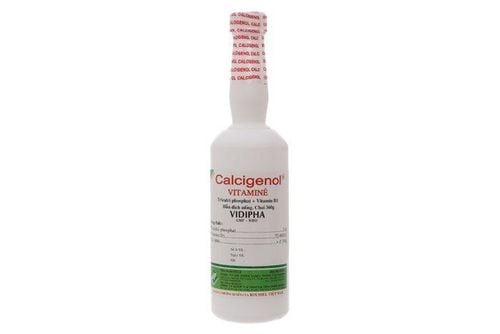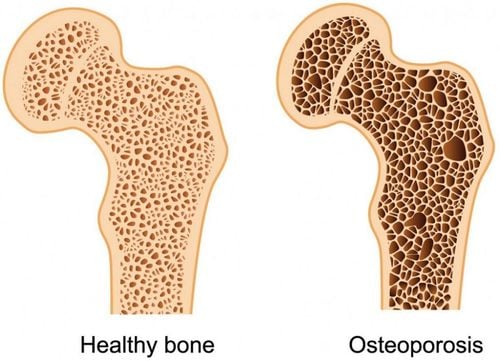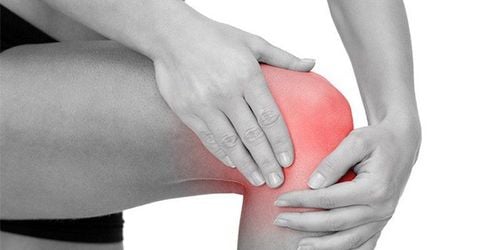This is an automatically translated article.
Calcigenol belongs to the group of tonics/minerals and vitamins, used for cases that need to prevent or treat calcium deficiency. The drug is prepared in the form of an oral suspension, bottled 360ml of suspension.
1. Uses of the drug Calcigenol
1 bottle of Calcigenol Vitamine 360g has active ingredients including: Tricalci phosphate, vitamin D2 and excipients just enough. Calcigenol is indicated for use in the following cases:
Adding calcium to the diet; Preventing the risk of rickets due to lack of nutrition; Prevention of the risk of metabolic rickets and osteomalacia; Prevention and treatment of osteoporosis (including corticosteroid-induced osteoporosis); Treatment of convulsions due to hypocalcemia. Calcigenol is contraindicated for the following cases:
Hypercalcemia, hypercalciuria or kidney stones; Hypersensitivity to vitamin D2.

Thuốc Calcigenol được sử dụng trong phòng ngừa bệnh còi xương
2. Usage and dosage of Calcigenol
How to use: How to take Calcigenol? The drug is taken orally but should not be taken in its entirety. The drug should be diluted in milk, water or fruit juice to drink. Should take the drug about 30 minutes before the main meal for the stomach to absorb the drug effectively.
Dosage: Supplement Calcigenol for infants, children and adults according to the following dosage:
Adults: 1 - 2 tablespoons, before 2 main meals; Children: 1 tablespoon, before 2 main meals; Newborns: 1 - 2 teaspoons x 2 - 4 times/day, mixed with water or milk; Prevention of rickets: As prescribed by a doctor. *Note: 1ml is equivalent to 1g of Calcigenol suspension, 1 teaspoon = 5ml, 1 tablespoon = 15ml.
Overdose: Stop using vitamin D or calcium, reduce calcium under the supervision of doctors, regularly monitor the patient's calcium level. Patients should be given plenty of fluids or fluids to increase urine volume and avoid kidney stones in patients with hypercalciuria.
Missed dose: If you forget to take a dose of Calcigenol, the patient should take it as soon as possible. If it is almost time for your next dose, skip the missed dose and take your next dose at the scheduled time.
*Note: The specific dosage is customized according to the condition, the progression of the disease, and is assigned by the doctor individually for each patient.
3. Calcigenol side effects
When using the drug Calcigenol, patients may experience some unwanted side effects:
Excessive use of vitamin D regularly can cause hypercalcemia and bone loss; Chronic hypercalcemia can be life-threatening. Early symptoms of this condition include: Nausea, vomiting, loss of appetite, weight loss, increased urination, increased thirst, weakness, fatigue, headache, drowsiness, dry mouth, metallic taste in mouth, buzzing In order to avoid these side effects, Calcigenol should not be treated too aggressively to avoid the risk of hypocalcemia. At the same time, it is necessary to regularly measure serum calcium levels, which should be maintained at 9 - 10 mg/dl. Serum calcium should not exceed 11 mg/dl.
In addition, during vitamin D therapy, it is necessary to periodically measure serum calcium, phosphate, magnesium, alkaline phosphatase, blood urea, calcium and urinary phosphate levels at regular intervals. A decrease in alkaline phosphatase levels often precedes hypercalcemia in patients with osteomalacia or renal osteodystrophy. Patients should be given plenty of fluids or fluids to increase urine volume and avoid kidney stones in patients with hypercalciuria.
When a patient experiences side effects of Calcigenol, it is necessary to stop using the drug and immediately notify the doctor or go to the nearest medical facility for timely examination and treatment.

Calcigenol có thể khiến bạn mệt mỏi khi bổ sung quá liều lượng
4. Precautions while using Calcigenol
Before using Calcigenol, patients should consult the information below:
Avoid taking Calcigenol with other drugs containing vitamin D to avoid overdose; In indications requiring repeated and high doses of Calcigenol, the patient's serum calcium and urinary calcium should be monitored, vitamin D supplies discontinued if serum calcium exceeds 105 mg/ml (2.62 mmol/l), or if urinary calcium exceeds 4mg/kg/day in adults, 4-6mg/kg/day in children; If high doses of calcium are used, it is necessary to monitor urinary calcium to avoid overdose; Pregnancy: Clinical trials have shown that vitamin D is not malformed or toxic to the fetus. Therefore, in case of necessity, Calcigenol can be used for pregnant women, but the correct dosage must be used; Breast-feeding women: In case of necessity, Calcigenol can be used for breastfeeding women, but the correct dosage must be used.
5. Calcigenol drug interactions
Some Calcigenol drug interactions include:
Thiazide diuretics: To avoid the risk of hypercalcaemia, patients should take the lowest recommended dose, increase blood calcium monitoring; Orlistat: Reduces the body's ability to absorb vitamin D. To avoid drug interactions, patients should inform their doctor about the drugs they are taking and receive appropriate advice and indications.
Calcigenol is used for patients who need to prevent and treat calcium deficiency. When taking the drug, the patient should follow all instructions given by the doctor. In case of any side effects during the use of the drug, the patient should immediately notify the doctor for timely detection and treatment.
Follow Vinmec International General Hospital website to get more health, nutrition and beauty information to protect the health of yourself and your loved ones in your family.
Please dial HOTLINE for more information or register for an appointment HERE. Download MyVinmec app to make appointments faster and to manage your bookings easily.













